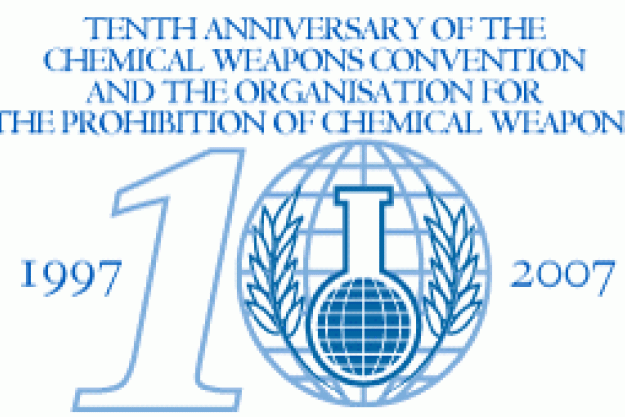
Ten years ago, on 29 April 1997, the global chemical weapons ban, the Chemical Weapons Convention (CWC), entered into force. It is the first disarmament treaty that stringently verifies the total and permanent abolition and eradication of a weapon of mass destruction (WMD), chemical weapons, which were the first and, tragically, the most frequently wielded WMD. In the past decade, 182 nations, representing about 98% of the global population, have joined the ban.
The Organisation for the Prohibition of Chemical Weapons (OPCW) was created by the CWC as the world’s chemical weapons watchdog agency, tasked to ensure that the ban is enforced. The 182 CWC States Parties are obliged to declare and eliminate any chemical weapons and any production capacity under international verification. They have pledged to prevent chemical weapons’ use and their proliferation. Together, the States Parties protect the vulnerable and support each other in their endeavour to effectively implement the ban.
Through the OPCW’s verification and Member States’ continuing efforts, 100% of the declared chemical weapons production facilities have been inactivated. All of these sites are subject to a verification regime of unprecedented stringency. Almost 90%, or 58, of the 65 chemical weapons production facilities declared to the Organisation by 12 States Parties have been certified as either destroyed or converted to peaceful purposes. A global stockpile, comprising 71,000 metric tons of chemical warfare agent, has been secured and is systematically inventoried to detect any diversion prior to destruction. In the meantime, over 30% of the 8.6 million chemical munitions and containers declared and secured as per the Convention’s stipulations have been verifiably destroyed. More than one quarter of the declared chemical warfare agent has been verifiably destroyed. The OPCW inspectors have conducted in total nearly 2,900 inspections, of which about 1,190 inspection missions have been conducted at industrial sites. More than 1,080 sites on the territory of 78 States Parties have been inspected since April 1997.
The OPCW Director-General, Ambassador Rogelio Pfirter, marked the tenth anniversary of the CWC’s Entry into Force by stating, “The States Parties’ unwavering political will and commitment to this unique disarmament enterprise, and their diligence in compliance with the chemical weapons ban, has created a responsive, adaptive and sustainable infrastructure that is freeing the world of these horrific weapons. The CWC is a beacon in multilateral disarmament. Nations that may not find consensus elsewhere have found common ground and work together harmoniously at the OPCW to bring about a world that uses chemistry exclusively for peaceful purposes.”
In his remarks, Director-General Pfirter commended the States Parties and global chemical industry for their crucial contribution in preventing the use, manufacture and spread of chemical weapons through resolute adherence to the CWC’s disarmament and non-proliferation regime. He stressed that international cooperation is one of the OPCW Member States’ fundamental guiding principles. It leads to greater trust, enhanced understanding between nations and heightened international security. Director-General Pfirter expressed his appreciation to the many OPCW Member States that generously provide their expertise, host specialised training programmes to support implementation and civil protection, and voluntarily offer material, technical support, personnel and funds to ensure that the ban can be effectively applied around the world.
29 April is also the date of the International Day of Remembrance for all Victims of Chemical Weapons, observed by all OPCW Member States. In this year, and as part of the OPCW’s commemoration of the CWC’s tenth anniversary, the permanent Memorial for all Victims of Chemical Weapons will be officially unveiled in The Hague by Her Majesty Beatrix, Queen of the Netherlands, on 9 May 2007.
PR35 / 2007, released 27-April-2007
